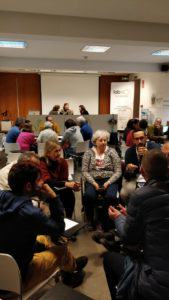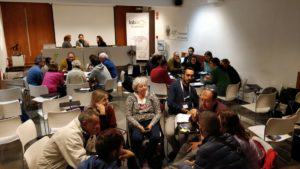LabIN Granada – the citizens’ laboratory

This project originates from the UGR in order to boost participation by the university and members of the public.
It aims to be a laboratory designed so that Granada’s citizens can participate more actively in their city. This gives rise to innovative ideas and solutions to problems.
On 5 November, Cicerone participated in a forum for good practices for heritage interpreters. As a company, at Cicerone we’re proud to be part of a city like Granada (Things to do in Granada), as it’s so rich in heritage and culture. That’s why we didn’t even have to think twice about being a part of this forum and about offering the guide our years of experience in the sector and guided tours across the city. During the forum, initiatives and two good practice for guides handbook were proposed. One of them for heritage interpreters and another for visitors. Better late than never, as we want to continue preserving our culture and heritage, which is why ideas for this guides were taken from codes in other tourist cities such as Valencia and Barcelona, our experience and citizen suggestions.
Granada Smart City: a new horizon
The University of Granada was very clear about this point: Granadian people build Granada. Therefore, in order to prepare the guides of good practices, the contributions made by the citizens in the digital platform at the service of Granada have also been taken into account. In CICERONE, we applaud this action for two reasons: the obvious one, having the opinion of the Granadian people is critical and because it is moving towards a more innovative city.
This commitment to technologies as an instrument of communication and construction of the city brings Granada closer to the Smart Cities that, shortly, will be leaders.In addition, in the Forum of good practices for heritage interpreters we knew that the presence of the new technologies in tourism and in the city must serve to highligt the historical wonders that we have in our city, without interrupting the rhythm of life of those who live in it.
If you want to know about this project, look at the YouTube channel Medialab UGR and you can see the 6 forums held to shape this project. Accordingly, it is important to remember that communication with both the participants in the forums and on the digital platform is still fluid, since we send newsletters to the 1034 subscribers. These subscriptions are the result of the 57,062 visits to the website from 19,476 different users. Thanks to these efforts, this initiative has been awarded in the European Network of Living Labs, a reference network in social innovation and open innovation in the European environment .
Sustainable Tourism in Granada
What is sustainable tourism and why is it important for our city? Sustainable tourism is based on tourism of any type, but always focusing on minimising the environmental impact on the city we’re visiting. This way, we can contribute to the economy and employment without any repercussions. Tourism has seen a notable growth in our city and every day, thousands of people visit the Alhambra, wander around the Albaicín (Tour Albaicín and Sacromonte) area or head to the shops in our city centre.
That’s why preserving and looking after our culture is more important now than ever. For some time now, investigations have been carried out to determine how Granada can become a city for sustainable tourism, based on the impact of the areas of interest or public transport for tourists who wish to visit the city.


